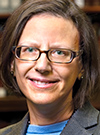Year of the Humanities Profile: Loving the Language of Law
Every summer in her youth, Vivian Curran would travel with her parents to their homeland of France. On trips to Paris and the countryside, her mother, Elizabeth, would pick up children’s books and mail them back to their home in Philadelphia in a big box. As Vivian would read works such as “La petite sœur de Trott (“Trott’s Little Sister”), she had a realization: The French words on the page went beyond their literal meaning to express deeper cultural subtleties.
“It was a Eureka moment,” she said. “Language isn’t a passive tool. It is part of a living structure, bound to a rich tapestry of history and society.”
a Eureka moment,” she said. “Language isn’t a passive tool. It is part of a living structure, bound to a rich tapestry of history and society.”
That sensitivity to cross-cultural nuances has guided her throughout her life. Now a distinguished faculty scholar and professor at the University of Pittsburgh School of Law, Curran specializes in comparative law.
To her, the humanities are as vital to the law as tort and motions.
“Comparative law is a form of translation from one legal culture to another. It comes embedded in politics, history, and literature. A constitutional charter has no meaning if it is not carried in the hearts and minds of its citizens. The humanities are as important as anything else in law to me.”
As Pitt celebrates this academic year as the Year of the Humanities in the University, it’s useful to see how a range of people from diverse fields draws from the humanities in their work.
Curran serves on the steering committee for this year’s celebration of the humanities at Pitt. Joining her are faculty in areas such as pharmacy, business, engineering, physics, and political science, as well as colleagues from English literature, music, and other humanities departments.
In her 25 years in the field of comparative law, Curran has watched the field grow rapidly as the world has become more global. “Capital moves with a click of a computer. Judges need to know about other countries’ legal systems. When people sue, there are all sorts of legal choices that cross national borders.”
The University of Pittsburgh law school offers a certificate in international and comparative law, a popular path for students who want to go into international business, or work at the United Nations or a governmental agency. She said some law students strengthen their credentials with a dual degree from the Graduate School of Public and International Affairs.
Curran didn’t start out wanting to study law. After receiving a bachelor’s of art in French literature from the University of Pennsylvania and a PhD in French literature and romance philology from Columbia University, she figured she would be a professor of French. It was a natural career path for a first-generation French-American who grew up speaking it. (In fact, her parents also taught her German.)
But then she decided that would be too easy. “I had a feminist feeling that I hadn’t proven myself.”
She taught French at Trinity School, a private college preparatory school in Manhattan while she earned a law degree at Columbia University. The next move was Pittsburgh, where she practiced corporate law at Rose, Schmidt, Hasley & DiSalle. After a few years, though, she realized she missed teaching. Then, 25 years ago, she landed her job at Pitt’s law school, the perfect blend of her interests. “I consider myself truly blessed. This is the one and only career for me.”
The vice president of the American Society of Comparative Law, Curran has won international recognition for her work. In 2007, the Republic of Austria honored her for her service as a United States appointee to the Austrian General Settlement Fund Committee for Nazi-era property compensation. “It was the most rewarding experience of my career,” she said.
In 2013, the French government decorated her for promoting French language and culture in the United States.
An expert in French law, she has entered her students in moot court competition in which they write a legal brief to a tribunal in Paris. She said she is proud of her team for advancing to the second of three rounds, a tough feat for non-native French speakers. “It is very hard. They don’t let me help.”
The woman who grew up speaking three languages also started the law school’s innovative Languages for Lawyers program, teaching students foreign languages in a legal context. The English for Lawyers program teaches foreign lawyers English legal terms.
“If law students can understand a little bit about another culture and language, it opens them up so much more” to that world, she said. The language school is a draw for the law school, she said.
Though the legal profession is known for logic and analytical reasoning, Curran encourages her students to tap into their creative side as well. “You need rigorous thought to be a lawyer. Absolutely. But you also need a soul if you want to be a thinker. We need people who can think out new problems with creativity.”
Other Stories From This Issue
On the Freedom Road

Follow a group of Pitt students on the Returning to the Roots of Civil Rights bus tour, a nine-day, 2,300-mile journey crisscrossing five states.
Day 1: The Awakening
Day 2: Deep Impressions
Day 3: Music, Montgomery, and More
Day 4: Looking Back, Looking Forward
Day 5: Learning to Remember
Day 6: The Mountaintop
Day 7: Slavery and Beyond
Day 8: Lessons to Bring Home
Day 9: Final Lessons

